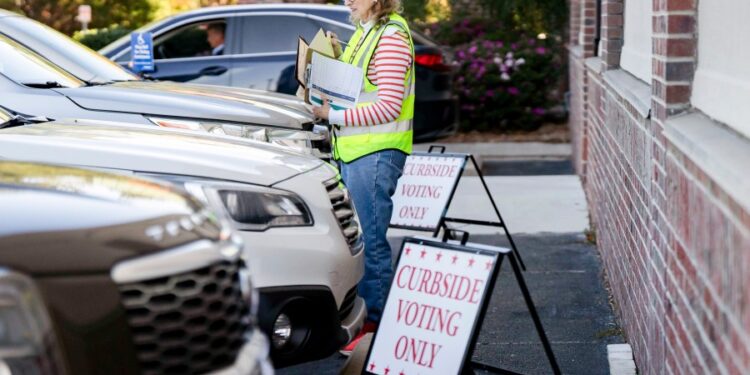
(NewsNation) — Early voting is now underway in two battleground states: Georgia and North Carolina; and officials are working to make sure those affected by Hurricane Helene in those states can still cast their ballots.
With the election less than three weeks away, many residents are still reeling from Helene. This has led to some drastic changes to the voting process.
North Carolina, for one, is a critical state for this election.
Back in 2016, former President Donald Trump won the state by more than three points, but in 2020, that margin shrank to only 1.3 points.
North Carolina early voting begins
Early voting began in the battleground state of North Carolina on Thursday, as thousands of potential voters still lack power and clean running water after Helene’s epic flooding.
Helene’s arrival three weeks ago in the Southeast decimated remote towns throughout Appalachia and killed at least 246 people, with a little over half of the storm-related deaths in North Carolina. It was the deadliest hurricane to hit the U.S. mainland since Katrina in 2005.
But despite the catastrophic damage, all but four of 80 sites in the 25 western counties hardest hit by the storm were set to open Thursday for the 17-day early vote period — a tremendous achievement according to State Board of Elections Executive Director Karen Brinson Bell, who credited emergency management workers, election officials and utilities.
More than 400 voting locations in the state’s 100 counties opened for the early voting period, State Board of Elections Executive Director Karen Brinson Bell said.
County leaders have made last-minute changes to accommodate voters. About 1.2 million registered voters in 25 counties are in areas affected by the storm.
Last week, the state board approved emergency measures for 13 western counties hit hardest by Helene. These measures give the county election boards the ability to extend early voting days and hours, as well as open polling places in another county if theirs has been damaged. Voters who can’t get to their Election Day voting site can cast a ballot at the county election office.
Voter ID will be required.
Early voting is popular in the presidential swing state of North Carolina. It will run through Nov. 2.
More than 3.6 million ballots — 65% of all cast ballots — were cast this way in the 2020 general election. In the 2016 election, 62% of all cast ballots were cast during early in-person voting.
Absentee voting in North Carolina began a few weeks ago, with over 67,000 completed ballots turned in so far, election officials said.
Harris vs. Trump polls
Vice President Harris and former President Trump have made recent stops in hurricane-hit states as they battle in a razor-thin race for the White House this fall. And in key battlegrounds, where the winner could be decided by a hair, the storms’ potential to depress turnout could tip the scales.
In both North Carolina and Georgia, polling averages from The Hill and Decision Desk HQ put the rivals roughly 1 point apart. A poll released on Wednesday gave Harris a 2-point lead over Trump among likely voters in North Carolina.
In North Carolina, the state board of elections approved a slate of emergency measures last week including tweaks to voting rules that give affected voters more time to request and deliver absentee ballots and allow voters to turn in absentee ballots at offices in counties other than their own. State lawmakers expanded those election alternations to 25 of the state’s 100 counties.
County boards can also modify early voting sites and timelines, with certain conditions. In Watauga County, for example, early voting sites will now be open on the weekend to give voters more flexibility. In-person early voting starts in the Tar Heel State this Thursday.
“To carry out this election through such devastation certainly is harder,” Bell said. “But our processes are working, and we are just exercising what we know to do.”
Helene misinformation stokes fears
The flood of conspiracy theories and rumors following the severe weather in the South is sparking concerns that political figures’ embrace of misinformation is just the beginning as the general election draws closer.
Voters and election watchers were already attuned to the potential for misinformation given long-lasting falsehoods over the 2020 election and efforts by foreign adversaries to influence this year’s race.
The persistent concerns come as Trump — the Republican presidential nominee — continues to baselessly claim the 2020 election was fraudulently decided in President Biden’s favor, despite several recounts and investigations.
One North Carolina resident, William Parsons, was arrested after posting a message on Facebook calling for people to “overtake” the FEMA site in Lake Lure, claiming that the agency was withholding supplies from hurricane survivors. Parsons said after his arrest that the law enforcement agents who arrested him were lying.
Record early voter turnout in Georgia
Georgia has set records so far as early voting continues in the state and chief operating officer for the Georgia secretary of state said he expects it to continue.
“We’ve had some lines in some places, but they’re like Chick-fil-A lines,” he said. “Just keep moving really fast, the great voter experience out there.”
Sterling said the presidential race is one factor driving turnout and that early voting has been seen across all demographics.
The Hill and The Associated Press contributed to this report.






